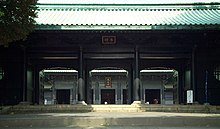Hayashi Akira
| Hayashi Akira | |
|---|---|

Hayashi Akira, 9th rector of Yushima Seidō.
|
|
| Born | 1800 |
| Died | 1859 Edo |
| Occupation | Neo-Confucian scholar, academic, administrator, writer, diplomat |
| Subject | Japanese history, literature |
Hayashi Akira (林 韑?, February 10, 1800 – October 12, 1859) (also known as Hayashi Fukusai) was an Edo period scholar-diplomat serving the Tokugawa shogunate in a variety of roles similar to those performed by serial Hayashi clan neo-Confucianists since the time of Tokugawa Ieyasu. He was the hereditary Daigaku-no-kami descendant of Hayashi Razan, the first head of the Tokugawa shogunate's neo-Confucian academy in Edo, the Shōhei-kō (Yushima Seidō).
Hayashi Daigaku-no-kami Akira was a member of the Hayashi clan of Confucian scholars, each of whom were ad hoc personal advisers to the shogun's prominent figures in the educational training system for the shogunal bureaucrats. The progenitor of this lineage of scholars was Hayashi Razan, who lived to witness his philosophical and pragmatic reasoning become a foundation for the dominant ideology of the bakufu until the end of the 19th century.
This evolution developed in part from the official Hayashi schema equating samurai with the cultured governing class (although the samurai were largely illiterate at the beginning of the Tokugawa shogunate). The Hayashi helped to legitimize the role of the militaristic bakufu at the beginning of its existence. His philosophy is also important in that it encouraged the samurai class to cultivate themselves, a trend which would become increasingly widespread over the course of his lifetime and beyond. One of Razan's aphorism encapsulates this view:
...
Wikipedia
